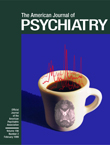Risperidone for Exclusively Negative Symptoms
To the Editor: Risperidone is a serotonin-2/dopamine-2 (5-HT2/D 2) receptor antagonist with demonstrated efficacy in the treatment of both positive and negative symptoms of schizophrenia (1). However, it has been suggested that the improvement in negative symptoms might be associated with changes in positive symptoms, extrapyramidal side effects, or depression (2, 3). Therefore, such symptoms could be considered to be secondary negative symptoms (2). In addition, whether risperidone is superior to classical antipsychotics in reducing negative symptoms remains controversial (3). We here report a schizophrenic patient whose prodromal negative symptoms were not ameliorated by low-dose thioridazine, chlorpromazine, or sulpiride. Furthermore, following his first acute exacerbation, the residual negative symptoms persisted for 4 years, even though he was treated with 5 mg/day of haloperidol (alone or plus 20 mg/day of fluoxetine). Finally, risperidone monotherapy (3 mg/day) brought a substantial improvement in the exclusively negative symptoms. Depressive or manic symptoms were absent throughout his history.
Mr. A, a 31-year-old Chinese man, was physically healthy and devoid of any seizure or substance abuse history. Nine years ago, his drive began to decrease insidiously. Affective flattening, alogia, and anhedonia also evolved. Major areas of functioning, e.g., interpersonal relations, academic/occupational performance, and self-care, progressively and markedly deteriorated. Seven years ago, he started to receive a sequence of pharmacologic regimens: thioridazine (up to 200 mg/day for 6 months), chlorpromazine (up to 200 mg/day for 6 months), and sulpiride (up to 300 mg/day for 10 months). These strategies did not cause parkinsonian side effects, but all failed to curtail the negative symptoms. Positive psychotic symptoms (referential delusions, persecutory delusions, and thought broadcasting) also emerged 5 years ago. Physical examinations, ECG, chest X-ray, urinalysis, hematology, serum chemistry, and serology all produced negative findings. Haloperidol, 10 mg/day, was prescribed and produced a full remission of the positive symptoms in 4 weeks but induced moderate tremor over the lower extremities. Hence, the dose was tapered to 5 mg/day over another 12 weeks. The motor side effects vanished, while the negative symptoms continued. Thereafter, 5 mg/day of haloperidol plus 20 mg/day of fluoxetine for 16 weeks and then 5 mg/day of haloperidol alone for 45 months still left the negative symptoms unchanged. No positive symptoms ever recurred. Compliance was carefully monitored by a key relative.
Six months ago, Mr. A gave written informed consent to receive risperidone monotherapy. After a 3-day drug-free period, the dose was titrated to 1.5 mg b.i.d. over 1 week. After 2 weeks of therapy, his negative symptoms started to recede. He no longer lay in bed all day long, and he gradually regained his drive, appropriate affect, recreational and social interests, and fluidity and productivity of the verbal process. After 6 weeks of therapy, he made new friendships and began seeking a job. Four more weeks later, he obtained an unskilled job following 8 years of unemployment. He has now kept the position for 4 months. All the negative symptoms have become negligible. Neither adverse drug reactions nor positive symptoms appeared after the initiation of risperidone treatment.
To our knowledge, this is the first report of treatment of solely negative symptoms (not associated with positive symptoms, depression, or extrapyramidal symptoms) of schizophrenia with risperidone alone. The observations should be considered preliminary. Undoubtedly, risperidone benefited from a halo effect of the enthusiasm associated with using a new medication. However, the present patient had previously failed to improve in multiple trials for the treatment of negative symptoms. A 6-week open pilot study (4) has indicated that the addition of fluoxetine to antipsychotics can improve both positive and negative symptoms in some schizophrenic patients. On the other hand, an 8-week double-blind, placebo-controlled study (5) has demonstrated that adjunctive fluoxetine is not effective in alleviating positive or negative symptoms in clozapine-treated schizophrenic patients. In addition, our patient with merely negative symptoms did not profit from 16-week coadministration of haloperidol and fluoxetine. It has been suggested (3) that low doses of risperidone are better than high doses in reducing secondary negative symptoms. A small dose (3 mg/day) was effective in the present case. Rigorous studies to assess the impact of risperidone treatment (especially at various doses) on primary negative symptoms are urgently needed. Risperidone's preferential 5-HT2 antagonism and the resulting serotonin-dopamine interaction might contribute to its potential efficacy in the treatment of negative symptoms (2, 3). However, since risperidone also exhibits high affinity for dopamine D4, histamine H1, and adrenergic a1 receptors (3), the various neurotransmitter effects on negative symptoms should be clarified (2 , 3).
1. Marder SR, Meibach RC: Risperidone in the treatment of schizophrenia. Am J Psychiatry 1994; 151:825-835Link, Google Scholar
2. Kane JM: Risperidone (editorial). Am J Psychiatry 1994; 151:802-803Link, Google Scholar
3. Kapur S, Remington G: Serotonin-dopamine interaction and its relevance to schizophrenia. Am J Psychiatry 1996; 153:466-476Link, Google Scholar
4. Goff DC, Brotman AW, Waites M, McCormick S: Trial of fluoxetine added to neuroleptics for treatment-resistant schizophrenic patients. Am J Psychiatry 1990; 147:492-494Link, Google Scholar
5. Buchanan RW, Kirkpatrick B, Bryant N, Ball P, Breier A: Fluoxetine augmentation of clozapine treatment in patients with schizophrenia. Am J Psychiatry 1996; 153:1625-1627Link, Google Scholar



